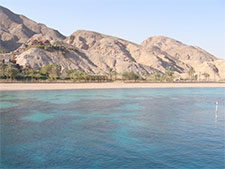Med, Red, and Dead: Exploring three seas and a new model of international study
Israel is home to three of the worlds most diverse marine systems the Mediterranean, Red and Dead Seas. Although found in rare and remarkable proximity, each is distinguished by unique oceanography, biology, flora and fauna, making Israel a particularly extraordinary destination for students of marine and environmental sciences.
This summer, from June 22 to July 6, Yonathan Zohar, chair of UMBCs Department of Marine Biotechnology, will lead students on an intensive study of the three Israeli seas at the Ruppin Academic Center, in Netanya, Israel, on the Mediterranean coast. Students will be exposed not only to the diverse biology of the three seas, but also to leading marine and environmental scientists from around the world. Exploring Three Seas: Med, Red and Dead which will explore such topics as marine and environmental biology, oceanography, marine and estuarine ecology, microbial ecology, marine flora and fauna, coastal geology and limnology through hands-on field trips and laboratories is the latest offering from an emerging model of focused, shorter-term study abroad programs at UMBC.
Exploring Three Seas: Med, Red and Dead is a part of a long-term research and educational partnership between UMBC and the Ruppin Academic Centers School of Marine Sciences. Expanding on UMBCs commitment to marine and biotechnology, faculty from UMBC and the Institute for Marine and Environmental Technology (a joint University System of Maryland research institute) have taught intensive, one-week courses at the Ruppin Academic Center for the past five years. Many of these same faculty members helped to develop the graduate program at the School for Marine Sciences. This summer program is what we hope to be the beginning of broadening the partnership between Ruppin Academic Centers School of Marine Sciences and UMBC, says Zohar.
International study and research are part of the culture at UMBC, allowing students to build their global outlook and cross-cultural skills. Shorter, intensive, professor-led trips, such as Zohars are a unique and increasingly popular prototype for study. Rather than the traditional mold of study abroad, which typically focuses on classroom-style learning and touring the regions of a country, these focus more intensely on experiential learning and fieldwork.
“These programs enable students to learn a great deal in a condensed time period not only about themselves and their academic interests, but also about the world around them,” says Katherine Heird, assistant director of Study Abroad at UMBC. “Because students are accompanied by their UMBC peers, faculty and staff, faculty-led programs are often an easier and less intimidating introduction to living and studying in a foreign country than other, more independent program models.”
UMBCs International Field Research Program is considered a pioneer of such innovative experiential study programs. Each spring, a small group of students from the Health Administration and Public Policy (HAPP) program spends the semester preparing for a seven-day summer trip to Switzerland, where they conduct individual field research to better understand how culture, policy and practice interact to achieve a sustainable and healthy society.
Thanks to dedicated faculty and funding from the U.S. Department of Education, UMBC is also launching an exciting summer study abroad in Ghana. Tyson King-Meadows, chair of Africana Studies, and Gloria Chuku, associate professor of Africana Studies, will lead “Understanding Culture and Politics in Ghana” from July 6 to August 4. The unique program is specifically designed for educators and will enroll both current K-12 teachers and undergraduate and graduate students interested in teaching careers.
As in other UMBC summer study abroad programs, participants will complete classroom, laboratory and field-based academic study, plus intensive language lessons. They will also experience intercultural exchanges with Ghanaian governmental and non-governmental officials, and guided-sightseeing activities to historical and cultural sites, exploring topics such as the Trans-Atlantic Slave Trade, the African anti-colonialism movement, and Ghanas experiences with different political systems.
Shorter programs often allow students whose schedules would otherwise not allow full semester travel to experience international and cross-cultural study and professors are being encouraged to consider this model. Maggie Holland, professor of Geography and Environmental Systems, is traveling with students from across four majors to Costa Rica for an international study in sustainable development and conservation. This innovative study abroad experience will involve a mix of field research and service learning. Over the course of 15 days, students will meet with community groups, engage in service learning, gain experience in field research techniques, participate in focus group discussions and contribute to mapping.
“We feel strongly that our departments offering of a field course should be designed to offer students a rich experience at relatively low-cost, and with a shorter time commitment than a full semester,” says Holland, who believes that academic, financial and family reasons often prevent students from taking a full semester abroad. “Offering this class as an early summer session course opens the program more broadly to UMBC students, as their perspectives and skills could lend substantially to the overall experience.
Rising junior and senior undergraduates (BIOL 499) and graduate students (BIOL 601) interested in Exploring Three Seas: Med, Red and Dead are encouraged to apply by the deadline of March 10.
(3/4/2014)

